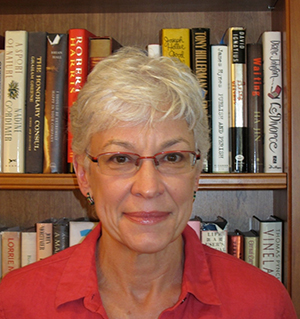Kathryn Woolard facts for kids
Quick facts for kids
Kathryn Woolard
Kathryn Woolard
|
|
|---|---|
 |
|
| Born |
Kathryn Ann Woolard
1950 Wellsville, New York, U.S.
|
| Education | B.A. University of Michigan, Ann Arbor, 1974 in English
M.A. University of California, Berkeley, 1978 in Anthropology Ph.D. University of California, Berkeley, 1983 in Anthropology |
| Occupation | Professor of Anthropology at the University of California, San Diego |
Kathryn Ann Woolard, born in 1950 in Wellsville, New York, is a professor who studies people and their languages. She teaches Anthropology at the University of California, San Diego. She is an expert in how language and culture are connected. She earned her Ph.D. in anthropology from the University of California at Berkeley.
From 2009 to 2011, Professor Woolard was the president of the Society for Linguistic Anthropology. This group is part of the American Anthropological Association.
Contents
Exploring Language and Culture
What Does Professor Woolard Study?
Professor Woolard is very interested in how language works in society. She studies how language connects to a group's identity, also known as ethnicity. She also looks at bilingualism, which is when people speak two languages. Her research explores how people's ideas about language, called language ideology, shape their lives. She also studies political discussions in places like Catalonia, Spain, and the United States.
How Language Shapes Society
Professor Woolard looks at how people use language in their daily lives. She sees language as more than just words. It's a tool for talking, a way to act in the world, and a way to understand things. Her work helps us see how our ideas about language show our views on society. Other famous thinkers who study language in similar ways include Pierre Bourdieu and Mikhail Bakhtin.
Professor Woolard has done a lot of research in Catalonia, a region in Spain. She studies how people there understand language and social rules. She focuses on how the Catalan language and Castilian are used. Catalonia has had political autonomy within Spain for many years. This means they have some self-governance. Professor Woolard explores how this has changed the role of the Catalan language.
She also looks at how the media talks about Catalonia. Sometimes, news reports focus on Catalonia's unique language and culture. Professor Woolard explains that the media often doesn't fully show how important language is to Catalan identity. She wrote a book about this called Singular and Plural: Ideologies of Linguistic Authority in 21st Century Catalonia. It was published in 2016.
Singular and Plural: Language in Catalonia
In her book, Singular and Plural: Ideologies of Linguistic Authority in Twenty-First Century Catalonia, Professor Woolard explores how language gets its power. She then uses this idea to understand the political situation in Catalonia. Through different examples, she shows how language use, identities, and ideas about language have changed there.
Because Catalonia has more self-rule within Spain, people's identities linked to Catalonia and its language have changed. Professor Woolard encourages other experts to notice how ideas about language, national pride, and being open to the world are connected in Catalonia. She offers a way to study how language gains authority. She then shows how this method can be used to understand language ideas in other places too.
Professor Woolard also looks at how news from the United States covers Catalonia. She points out that the media's view of language and politics can be limited. Her book won the Society for Linguistic Anthropology Edward Sapir Book Prize in 2017.
Selected Books and Publications
- 1989. Double Talk: Bilingualism and the Politics of Ethnicity in Catalonia.
- 1992. Identitat i contacte de llengües a Barcelona. (This book is about identity and language contact in Barcelona).
- 1998. Language Ideologies: Practice and Theory (edited with Bambi Schieffelin and Paul V. Kroskrity).
- 2001. Languages and Publics: The Making of Authority (with Susan Gal).
- 2016. Singular and Plural: Ideologies of Linguistic Authority in 21st Century Catalonia.
See also
 In Spanish: Kathryn Woolard para niños
In Spanish: Kathryn Woolard para niños
 | Stephanie Wilson |
 | Charles Bolden |
 | Ronald McNair |
 | Frederick D. Gregory |

